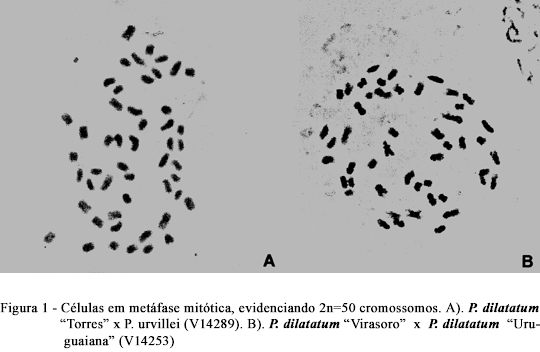Paspalum dilatatum is a native grass in subtropical South America, with good forage value and broad intraspecific variability. Distinct morphological, cytological and reproductive types have been cited for the species. "Common" P. dilatatum is the biotype of greatest agronomic interest. The assessment of the species importance as a component of good quality forage production in natural pastures has resulted in continuous interest for the possibility of its enhanced use in cultivation. Among materials of the Dilatata group analyzed here, six accessions of uncertain taxonomic classification showed a distinct morphology. We believe they result from natural hybridization processes in yet unknown combinations. Mitotic analysis showed they all have 2n=50 chromosomes. Three of these accessions showed intermediate morphological features between "Virasoro" (4x, sexual) and "Uruguaiana" (6x, apomitic) biotypes. Confirmation of close geographic occurrence stresses the hybridization hypothesis, and broadens the known area of occurrence of the sexual biotype involved in this cross. The other accessions are, most probably, natural hybrids between the "Torres" biotype of P. dilatatum and P. urvillei. Such accessions have inflorescences with a larger axis and more branches than typical plants of "Torres" biotype. Morphological and cytological characterization of this different materials may lead to the establishment of reliable parameters for their differentiation and possible assignment to an adequate taxonomic category. We suggest that these new pentaploid biotypes, distinct from the "Common" biotype, derived from crosses that occurred in Southern Brazil between other biotypes and species of the group.
Paspalum dilatatum; biotype; pentaploid; hybridization




